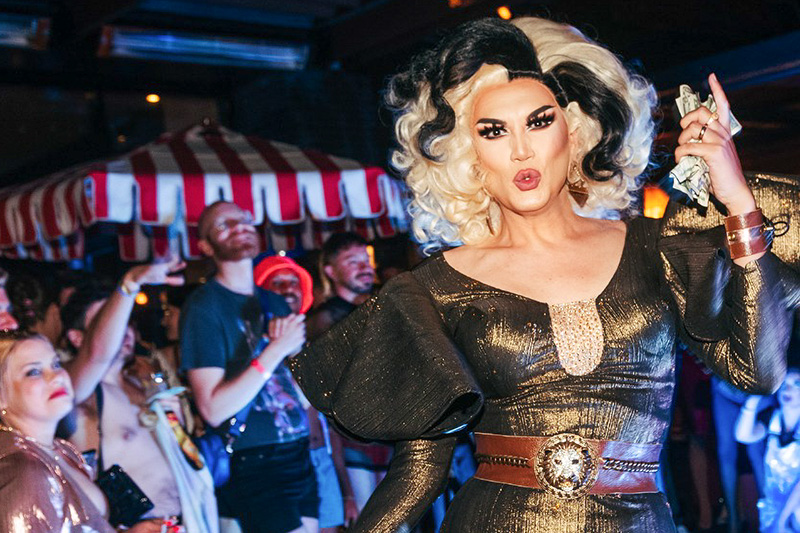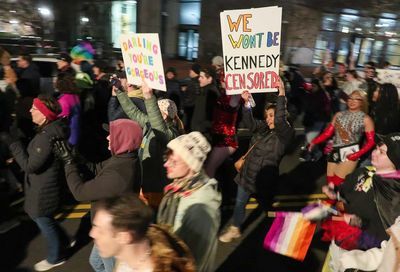European Court declares Russian “gay propaganda” law to be discriminatory
Court of Human Rights says law violates freedom of expression and serves "no legitimate public interest"

On Tuesday, the European Court of Human Rights declared a Russian law banning expressions of “gay propaganda” to be discriminatory, and has ordered the country to compensate three LGBTQ activists who sued over the law.
LGBTQ activists Nikolay Bayev, Aleksey Kiselev, and Nikolay Alekseyev challenged the law after they staged three separate demonstrations between 2009 and 2012, during which they held banners stating that homosexuality is natural or normal, and not a perversion. The demonstrations took place in front of a secondary school, a children’s library, and an administrative building. All three activists were subsequently fined for violating the law, and unsuccessfully attempted to appeal their convictions.
In a statement explaining its decision, the court said that the 2013 law “had reinforced stigma and prejudice and encouraged homophobia, which was incompatible with the values of a democratic society.” The court also noted that the purpose of the law and the way it was applied in the case against the LGBTQ activists “served no legitimate public interest.”
Under the “gay propaganda” law, people are prohibited from disseminating information that portrays homosexuality in a positive light. The law is specifically geared toward stopping the “promotion of non-traditional sexual relationships among minors” or the equating of “traditional and non-traditional sexual relationships.”
But the European Court of Human Rights found that the law violates articles of the European Convention on Human Rights, of which Russia is a signatory. The court claims the law violates freedom of expression and demonstrates a “predisposed bias” against sexual minorities, writing that the Russian government has “failed to demonstrate how freedom of expression on LGBT issues would devalue or otherwise adversely affect actual and existing ‘traditional families’ or would compromise their future.”
The court also rejected the argument that the law is necessary to protect minors from being “converted” or enticed into homosexual behavior. The court noted that providing information about sex and gender identity issues to LGBTQ people would be an “indispensable” part of any disease-prevention campaign or public health policy — and that banning the dissemination of such information could have negative consequences. Lastly, the court found, the signs that the demonstrators carried were neutral in tone and did not constitute the “promotion” of homosexuality.
A spokesperson from Human Rights Watch was not immediately available for comment.
Despite homosexuality being decriminalized in 1993, homophobic attitudes persist in the conservative society, which is highly influenced by the Orthodox Church. Despite laws that purport to protect LGBTQ citizens from discrimination, in practice, many LGBTQ people find themselves the target of discrimination, as was demonstrated by a the owner of a grocery store chain who posted a sign prohibiting gay people from entering his stores.
The ruling also shines a brighter spotlight on Russia’s actions (or lack thereof) in dealing with reports of alleged persecution of gay and bisexual men in the Russian republic of Chechnya. According to reports from the Russian newspaper Novaya Gazeta and human rights observers, hundreds of gay men were detained and tortured in secret detention facilities, with tens being killed after their release, mostly by family members as part of “honor killings.”
World leaders, including French President Emmanuel Macron and German Chancellor Angela Merkel, have called on Russian President Vladimir Putin to investigate reports of persecution, and asked him to take action to ensure that sexual minorities are protected. But both the Kremlin and Chechen President Ramzan Kadyrov, who has close ties to Putin, have denied the reports, with Kadyrov going so far as to deny the existence of an LGBTQ community in Chechnya.
Support Metro Weekly’s Journalism
These are challenging times for news organizations. And yet it’s crucial we stay active and provide vital resources and information to both our local readers and the world. So won’t you please take a moment and consider supporting Metro Weekly with a membership? For as little as $5 a month, you can help ensure Metro Weekly magazine and MetroWeekly.com remain free, viable resources as we provide the best, most diverse, culturally-resonant LGBTQ coverage in both the D.C. region and around the world. Memberships come with exclusive perks and discounts, your own personal digital delivery of each week’s magazine (and an archive), access to our Member's Lounge when it launches this fall, and exclusive members-only items like Metro Weekly Membership Mugs and Tote Bags! Check out all our membership levels here and please join us today!

























You must be logged in to post a comment.